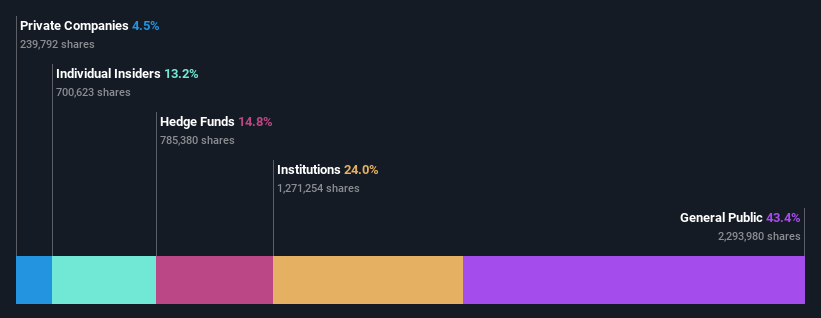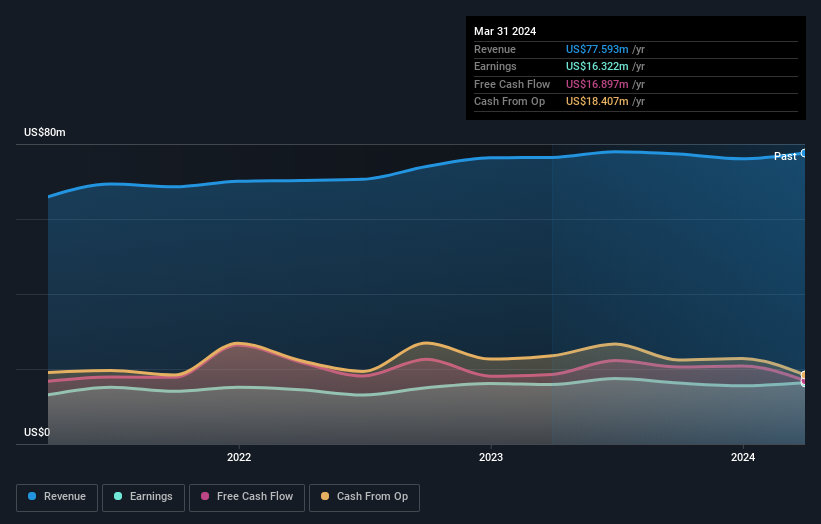Institutions own 24% of Peoples Bancorp of North Carolina, Inc. (NASDAQ:PEBK) shares but retail investors control 43% of the company
Key Insights
Significant control over Peoples Bancorp of North Carolina by retail investors implies that the general public has more power to influence management and governance-related decisions
A total of 21 investors have a majority stake in the company with 50% ownership
A look at the shareholders of Peoples Bancorp of North Carolina, Inc. (NASDAQ:PEBK) can tell us which group is most powerful. We can see that retail investors own the lion's share in the company with 43% ownership. That is, the group stands to benefit the most if the stock rises (or lose the most if there is a downturn).
Meanwhile, institutions make up 24% of the company’s shareholders. Institutions often own shares in more established companies, while it's not unusual to see insiders own a fair bit of smaller companies.
In the chart below, we zoom in on the different ownership groups of Peoples Bancorp of North Carolina.
Check out our latest analysis for Peoples Bancorp of North Carolina
What Does The Institutional Ownership Tell Us About Peoples Bancorp of North Carolina?
Institutions typically measure themselves against a benchmark when reporting to their own investors, so they often become more enthusiastic about a stock once it's included in a major index. We would expect most companies to have some institutions on the register, especially if they are growing.
As you can see, institutional investors have a fair amount of stake in Peoples Bancorp of North Carolina. This can indicate that the company has a certain degree of credibility in the investment community. However, it is best to be wary of relying on the supposed validation that comes with institutional investors. They too, get it wrong sometimes. If multiple institutions change their view on a stock at the same time, you could see the share price drop fast. It's therefore worth looking at Peoples Bancorp of North Carolina's earnings history below. Of course, the future is what really matters.
It would appear that 15% of Peoples Bancorp of North Carolina shares are controlled by hedge funds. That's interesting, because hedge funds can be quite active and activist. Many look for medium term catalysts that will drive the share price higher. The company's largest shareholder is Fourthstone LLC, with ownership of 9.2%. Strategic Value Bank Partners LLC is the second largest shareholder owning 5.7% of common stock, and The Vanguard Group, Inc. holds about 4.7% of the company stock. In addition, we found that Lance Sellers, the CEO has 0.5% of the shares allocated to their name.
A closer look at our ownership figures suggests that the top 21 shareholders have a combined ownership of 50% implying that no single shareholder has a majority.
Researching institutional ownership is a good way to gauge and filter a stock's expected performance. The same can be achieved by studying analyst sentiments. We're not picking up on any analyst coverage of the stock at the moment, so the company is unlikely to be widely held.
Insider Ownership Of Peoples Bancorp of North Carolina
The definition of company insiders can be subjective and does vary between jurisdictions. Our data reflects individual insiders, capturing board members at the very least. The company management answer to the board and the latter should represent the interests of shareholders. Notably, sometimes top-level managers are on the board themselves.
Most consider insider ownership a positive because it can indicate the board is well aligned with other shareholders. However, on some occasions too much power is concentrated within this group.
Our most recent data indicates that insiders own a reasonable proportion of Peoples Bancorp of North Carolina, Inc.. Insiders have a US$20m stake in this US$149m business. We would say this shows alignment with shareholders, but it is worth noting that the company is still quite small; some insiders may have founded the business. You can click here to see if those insiders have been buying or selling.
General Public Ownership
The general public, who are usually individual investors, hold a 43% stake in Peoples Bancorp of North Carolina. While this size of ownership may not be enough to sway a policy decision in their favour, they can still make a collective impact on company policies.
Private Company Ownership
Our data indicates that Private Companies hold 4.5%, of the company's shares. It's hard to draw any conclusions from this fact alone, so its worth looking into who owns those private companies. Sometimes insiders or other related parties have an interest in shares in a public company through a separate private company.
Next Steps:
It's always worth thinking about the different groups who own shares in a company. But to understand Peoples Bancorp of North Carolina better, we need to consider many other factors. Consider risks, for instance. Every company has them, and we've spotted 2 warning signs for Peoples Bancorp of North Carolina you should know about.
Of course, you might find a fantastic investment by looking elsewhere. So take a peek at this free list of interesting companies.
NB: Figures in this article are calculated using data from the last twelve months, which refer to the 12-month period ending on the last date of the month the financial statement is dated. This may not be consistent with full year annual report figures.
Have feedback on this article? Concerned about the content? Get in touch with us directly. Alternatively, email editorial-team (at) simplywallst.com.
This article by Simply Wall St is general in nature. We provide commentary based on historical data and analyst forecasts only using an unbiased methodology and our articles are not intended to be financial advice. It does not constitute a recommendation to buy or sell any stock, and does not take account of your objectives, or your financial situation. We aim to bring you long-term focused analysis driven by fundamental data. Note that our analysis may not factor in the latest price-sensitive company announcements or qualitative material. Simply Wall St has no position in any stocks mentioned.
Have feedback on this article? Concerned about the content? Get in touch with us directly. Alternatively, email editorial-team@simplywallst.com

 Yahoo Finance
Yahoo Finance 

